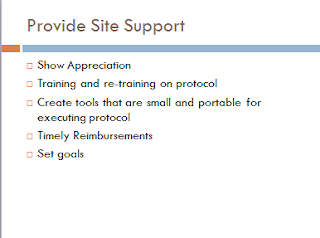This is the third and final portion of a presentation I delivered at a conference in February 2012 entitled: "Striving for improved Investigator and site relationships to achieve higher commitment and optimal patient numbers"
Click here to go back and review Part I
Click here for a link back to Part II
Read Part III - conclusion below
_________________________________________________________________
 |
| Thank your investigative sites often and genuinely. |
What are they doing right?
Great care and consideration went in to choosing these sites. Surely you can think of something they are doing well and praise them for it. It is very important to recognize effort and address issues in a timely fashion. If the site is inexperienced or very busy, they might benefit from a Study Coordinator buddy program. This engages the problem site but also recognizes the helper site as a "model" site; it is a benefit to both sites.
Give 'em Goodies
Some tools and forms of recognition are free or low-cost. Here are examples from other studies I have used.
- MD to MD brochures
- In-service slidedecks for training within their practice
- CRF revision guides
- Mini-protocols
- Newsletters
- pocket inc/exc cards
- dose modification and calculation cards
- Visit window calculators/wheels
- Laminated diagrams and figures
Pay them on time
Like you, the study sites are running a business and they have monthly expenses to cover; don't delay to pay. By providing timely reimbursements you demonstrate respect, fulfill your contractual obligations, and increase the likelihood that sites will work harder for you in this study and the next when. When the sites achieve their goals you should pay them.
_________________________________________________________________
 |
| Doing small, minimally time-consuming tasks will have a site jump through hoops for you… |
How can you help them reach their goals?
Think about all the administrative items that are involved in terms of recruitment, enrollment, data entry/query resolution, and monitoring completion. My team and I have come up with lots of little time-savers to help our sites along the way. Sometimes it is as simple as a pre-printed FedEx label, making some copies, or sending an empty 3-ring binder they can used to stay organized. If there are forms or documents that are routinely filled out by all sites, have the monitors assist or provide example completed forms as you know the forms well and will be more familiar.
I love telling the story of a site that my team was brought in to rescue. They were behind by 6 months in data entry because 10 surgical charts had not been obtained from the hospital. We paid for the copies and sent a courier to pick up those charts (pictured above). The Study Coordinator had just been putting it off since it was an unpleasant task. We brought in lunch several days, trained her on the EDC system, assisted in flagging adverse events, helped her organize her subject binders, and sat with her as she worked through the auto-queries. It was a long but productive week and she was so grateful and quick to resolve all queries from that point forward because we had helped her catch up.
_________________________________________________________________ |
| Ensure monitors have a deep knowledge of the protocol and any amendments. |
This slide could really be a presentation topic in itself, but you must ensure monitors have protocol fluency.
Make sure monitors know which deviations adversely affect endpoint and how to report and re-train staff. If a subject finishes the trial but is not evaluable, you have wasted a randomization slot, you might not be able to power your study, and you have needlessly paid for monitoring and conduct and learned very little about your drug product.
If you can incentivize your monitors to help study coordinator's during their visits and reduce administrative burden rather than nit-picking them, your sites will perform better. It is a monitors' responsibility to be a partner, not an adversary or a hall monitor. It is your responsibility to remind them on this charge. They are the face of your company in this trial and your reputation rests with them.
_________________________________________________________________
 |
| Be flexible to review and adjust messaging in your study. |
The bottom line is that good relationships matter. Solid relationships are obtained through:
1) listening
2) supporting
3) Training
Yes, you are in a rush to finish your study but don't let the shortsightedness of the endpoints prevent you from creating a lasting relationship that will endure throughout the entire drug development program. Align the entire study team in this venture and obtain buy in from the top down so you can take the necessary time before, during, and after the study to reach out to investigative sites with the best support and recognition possible. Best wishes for deep relationships and quality data.
_________________________________________________________________
You may also like...from The Lead CRA archives:
- Closing non-performing Sites April 2012
- Motivating Study Coordinators Feb 2011
- Meeting with PIs Aug 2011











No comments:
Post a Comment
Note: Only a member of this blog may post a comment.